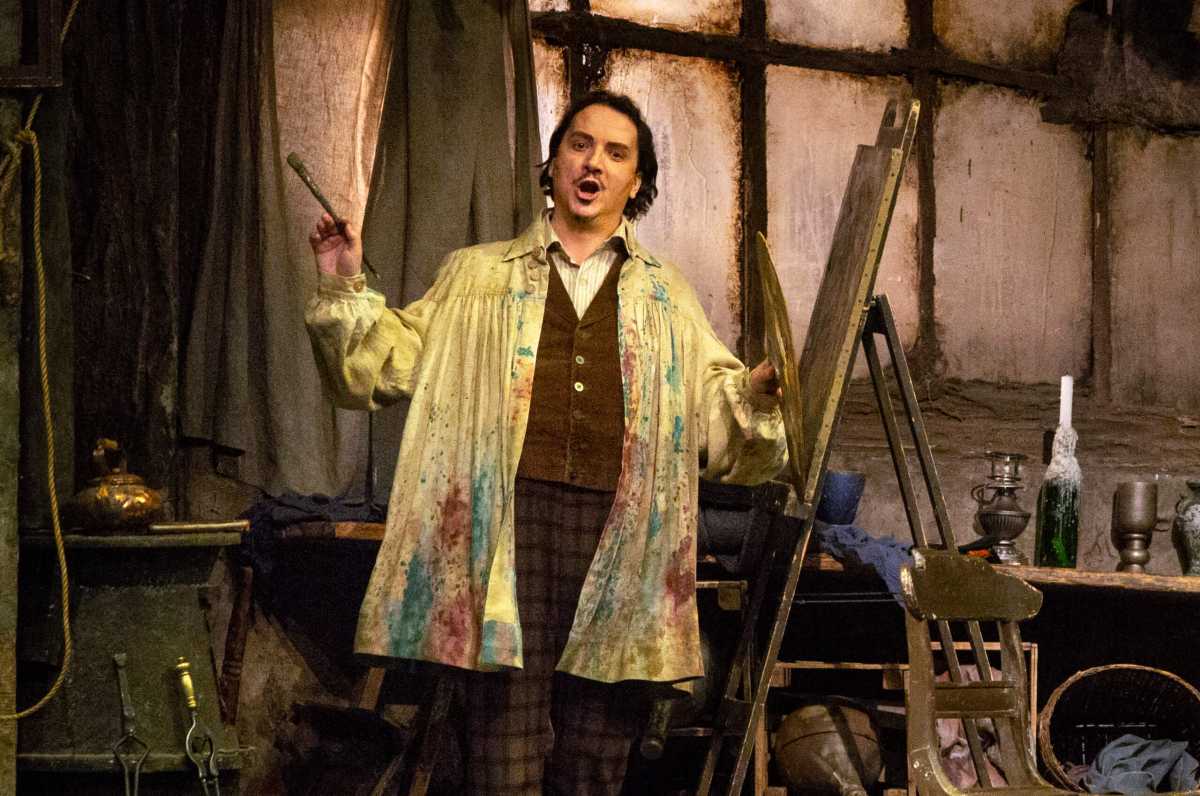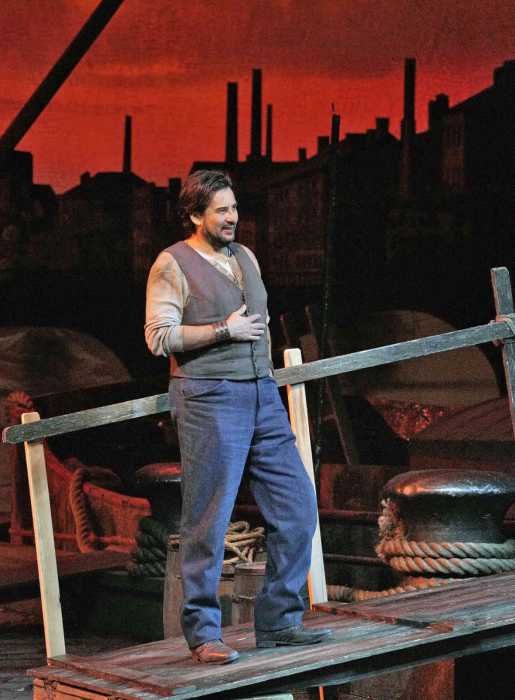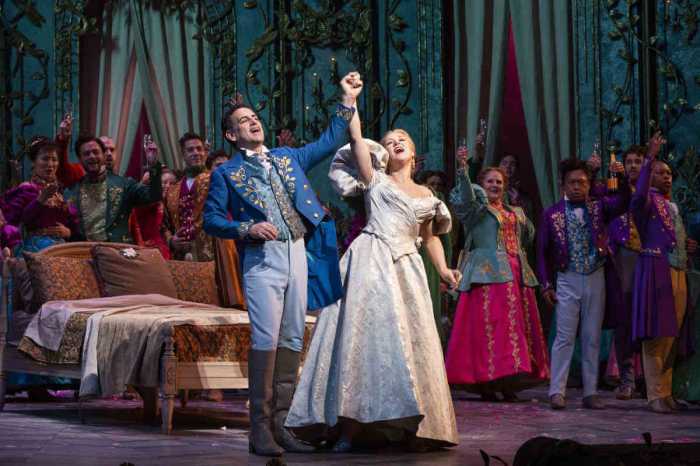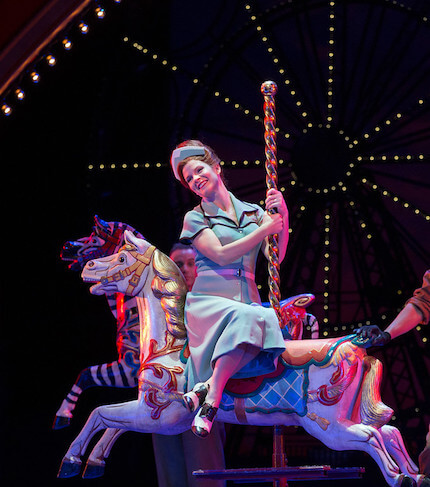At the Met’s January 21 “La Bohème,” the best singing by far — sonorous and nuanced — came from the accomplished Marcello, Artur Rucinski. Returning to his Met debut role after many years, star tenor Roberto Alagna exuded plausible youthful ardor; as always his diction proved exceptional. Some leathery tone at loud dynamics and a truly unwise interpolated high C at Act One’s close distracted from an otherwise interesting demonstration of his ability still to sing softly after undertaking Otello and Samson. The tenor/ baritone duet “O Mimì, tu più non torna,” beautifully calibrated, furnished the evening’s highlight.
Maria Agresta, the latest artist termed “the new great Italian soprano,” seemed to have deteriorated since her 2013 New York concert debut in terms of steadiness and focus. She varied dynamics but with little sense of ease or legato phrasing; the middle could turn wavery and louder high notes hard. Was programming Norma and “Roberto Devereux” a mistake? Dramatically her knowing Mimì was too consistently arch; I’ve heard few less moving.
Susanna Phillips’ smiling Musetta went through the motions professionally but was individual only in really treating the slow start of the too-familiar Waltz in a relaxed, Viennese manner. Unfortunately the vocal charm vanished when she let her tone unfurl. Elliot Madore (Schaunard) too often sang with scant regard for pitch, and Christian Van Horn (Colline) sounded, as usual, like a good, affable house bass, not the star his current assignments suggest. Routinier Marco Armiliato indulged some mighty slow tempos. The crowd cheered all the participants as if some Golden Age had returned. To me, only Act Three of this saurian Zeffirelli staging still works: I miss the pathos and youthful vulnerability of James Robinson’s 1914-set City Opera production.
Two nights later, the New York Philharmonic under Gustavo Dudamel paired Schubert’s Fourth (“Tragic”) Symphony with Mahler’s amazing final work, “Das Lied von der Erde” (“The Song of the Earth”). The early Schubert reflects the classicizing “italianità” of the young composer’s studies with Antonio Salieri, and only in its springy, exciting fourth movement did it come to life and explain why Dudamel wanted to program it. By contrast, the Mahler witnessed the orchestra in gleaming form, with exceptionally eloquent solo work from the clarinets, oboe, brass, celesta, and cello. Practised Mahler interpreter Michelle DeYoung brought a somewhat loosened vibrato and inconsistent projection to her music, but the voice in many places retained its quality and she managed the range effectively. In the wondrous “Abschied” (“Farewell”), DeYoung channeled the needed emotion, if rather elementally. Her voice would have been a good balance for that of Simon O’Neill, but the Heldentenor awoke with no voice, Andrew Staples — pretty much a dead loss as Andres in the Met’s “Wozzeck” — filled in, on little notice but one rehearsal, very musically indeed, unfazed by the murderous tessitura if not very characterful as to timbre. A good save.
Schubert’s somber masterwork “Winterreise” had several high-profile traversals slated for this less-wintry than-usual season. Eric Owens deferred his due to illness; Joyce DiDonato and Yannick Nézet-Séguin turned in a fascinating revisionist performance last month, and Peter Mattei brings his to Zankel January 31. Meanwhile, in the sonically excellent Christ and St. Stephen’s Church near Lincoln Center, Dutch baritone Hans Pieter Herman offered a very compelling, thoroughly idiomatic reading on January 12.
Herman, who’s recorded a fine Robert Schumann CD, wields a sonorous, wide-ranging middleweight baritone, capable of enough vocal power but also the needed delicacy (triplets in place, admirable soft attacks, and a “fil di voce”) for the music. As an experienced actor in both opera and music theater, he — like DiDonato — brought to the cycle something beyond a traditional “presentational” approach: he really embodied the narrating voice, with vivid facial expressions and well-considered gestures and stances along with modulated colors in the voice. Unlike many recitalists I’ve heard in New York this year, he performed off book and was thus directly communicative.
I’d heard the multitalented Lucy Arner for years as an incisive Italianate conductor and a deadpan drag king accompanist (Maestro Sergio Zawa) to the beyond stellar diva Mme. Vera Galupe-Borszkh (Ira Siff, Herman’s husband). But I’d never heard Arner in an assignment like Schubert’s cycle, and it was salutary to hear such a surely weighted touch and well-calculated pace in the sober lyricism of “Winterreise.” The fine collaboration duly impressed an industry crowd in a most welcome concert.
The American Symphony Orchestra concert December 19 at Alice Tully Hall showcased an interesting, illuminating program devised by Leon Botstein: four works — one symphonic, three vocal — by the composer sons of Johann Sebastian Bach (1685-1750), whose genius was only fully to be recognized in the early 19th century. The sons — born to successive wives and actually thus from two different generations — had varied careers, but for a while the family star was Carl Philipp Emanuel Bach (1714-88), whose strong “Magnificat” proved well worth hearing. Fine flute and oboe obbligato playing distinguished Wilhelm Friedemann Bach’s (1710-1784) “Erzittert und fallet” (“Tremble and falter”), a religious cantata lasting 30 minutes. The Bard Festival Chorus showed better intonation and ensemble in runs than in skips.
Amanda Woodbury has made several welcome outings as a Met Woglinde and “cover” artist, her Leila and Juliette superior in freshness and even projection to the bigger star whose alternate she was. She also showed a very accomplished Violetta at Glimmerglass. The voice is bright, clean and seamless, projecting very well in several duets as well as in Johann Christoph Friedrich Bach’s (1732-1795) scena “Die Amerikanerin” (“The American Woman”), less than 10 minutes of Classical-era exoticism. Her ascent seems predestined. Personable onstage, high-flying tenor Jack Swanson has garnered good reports and here he sang very well indeed, with forthright fluency, secure focus and a nice tonal shine. Some get excited when they hear sopranos and tenors destined for Puccini’s Mimì and Rodolfo; I for one would like to hear Woodbury and Swanson as Mozart’s Constanze and Belmonte.
I wished the Bach sons had given Taylor Raven more to sing as her expressive, old-fashioned alto suited this repertory very well; she’d make a fine Amastre in “Serse.” Chris Kenney fielded a well-trained lyric baritone with some agility but is probably destined more for a career in post-baroque music.
David Shengold (shengold@yahoo.com) writes about opera for many venues.



































